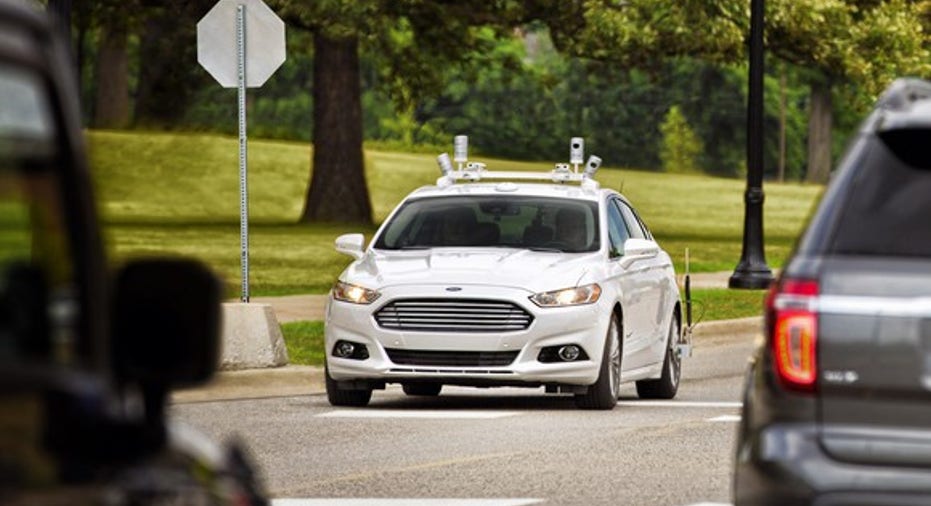Ford: We'll Mass-Produce Self-Driving Cars by 2021

A prototype self-driving Ford Fusion undergoes testing on public roads in California. Ford said it will begin mass-producing a self-driving car in 2021. Image source: Ford Motor Company.
Ford Motor Company (NYSE: F) announced on Tuesday that it will mass-produce self-driving vehicles -- for ride-sharing and ride-hailing services -- by 2021.
A carefully worded statement of intent
Ford's statement was carefully worded: "Ford today announces its intent to have a high-volume, fully autonomous SAE level 4-capable vehicle in commercial operation in 2021 in a ride-hailing or ride-sharing service."
Ford also announced investments in or collaborations with four small high-tech companies that will assist its self-driving research and development efforts.
CEO Mark Fields and global product chief Raj Nair shared more details in a presentation at Ford's research center in Palo Alto, California.
What does that statement mean?
First of all, "SAE Level 4" is a fully automated self-driving vehicle under the Society of Automotive Engineers' standards for automated-driving systems. "No steering wheel, no gas pedal, no brake pedal, driver not required," Fields said.
Ford also wanted to make the point that this won't be a pilot program. "High-volume" means that these self-driving Fords will be mass-produced. Nair emphasized that the self-driving Ford will be designed from the ground up as an autonomous vehicle. Ford won't tack the system on to one of its existing models.
But why limit it to ride-sharing or ride-hailing services?
Why won't Ford sell its self-driving car directly to consumers in 2021? The answer likely has to do with maps: Self-driving systems like the one that Ford has under development require precisely detailed three-dimensional maps of the areas in which they operate. Limiting the cars to ride-hailing and ride-sharing services is probably Ford's way of restricting the cars to specific geographical areas (a major city, for instance, or a predefined delivery route) while it works on expanding its maps.
"We don't expect fully autonomous vehicles to be used for personal service for several years past their introduction," Nair said, "because the economics just don't make sense." But, he said, the vehicles' uses will likely be expanded to other commercial uses such as package delivery before they hit the retail market.
Nair said that Ford plans to work with one of its new high-tech partners, machine-vision specialist Nirenberg Neuroscience LLC, to develop technology that might allow its system to operate safely without the precise 3D maps in the future.
So is this a big deal?
It is. But it's very hard to say what it means for Ford investors. Thedetails will matter, and there are many we don't know yet.
It's an important statement of intent by Ford, a clear signal that the company intends to be a major player in the self-driving future, andthat it's committing big resources to get there. But it's not exactly groundbreaking. In fact, it's more like catching up: Rival General Motors (NYSE: GM) is following a similar plan, but it appears to be much further along. GM intends to begin testing self-driving electric Chevy Bolts with ride-hailing service Lyft in a U.S. city -- not by 2021, but within a year.
Ford's stated ambitions are much bigger and involve many more cars, of course. But GM has a stake in Lyft, and other automakers have announced partnerships with other ride-hailing companiesaround the world. At least at the moment, Ford doesn't have a ride-hailing partner. Will it form a partnership with an established ride-hailing firm -- or will it start its own?
There are more unanswered questions. How much will the vehicles cost? Where will they be built? How expansive will Ford's 3D maps be by 2021?
We don't know yet. Until we do, it's hard to say how Ford's plan stacks up.
A secret billion-dollar stock opportunity The world's biggest tech company forgot to show you something, but a few Wall Street analysts and the Fool didn't miss a beat: There's a small company that's powering their brand-new gadgets and the coming revolution in technology. And we think its stock price has nearly unlimited room to run for early in-the-know investors! To be one of them, just click here.
John Rosevear owns shares of Ford and General Motors. The Motley Fool owns shares of and recommends Ford. The Motley Fool recommends General Motors. Try any of our Foolish newsletter services free for 30 days. We Fools may not all hold the same opinions, but we all believe that considering a diverse range of insights makes us better investors. The Motley Fool has a disclosure policy.



















